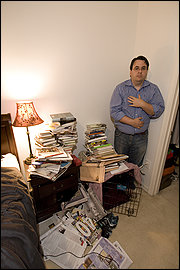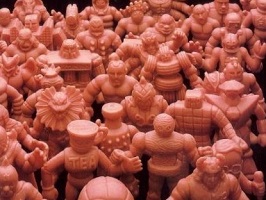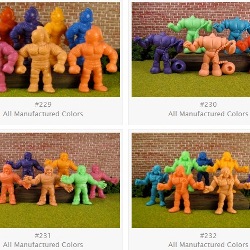
Photo by Michael Northrup
1. The well-written, accessible, first-person personal account of hoarding behavior.
2. The insight into the reasons why people accumulate items.
It would be naïve not to assume that at least some M.U.S.C.L.E. collectors are afflicted with hoarding tendencies. Even if every M.U.S.C.L.E. collector was given a perfect bill of mental health there would still be value in wondering, “Why do I need to have these little pieces of plastic?”
The American Psychiatric Association does not currently list Hoarding as its own entity – rather a symptom of obsessive-compulsive personality disorder. There are some people that argue Hoarding should receive its own designation as a disorder. Regardless of its classification, the behaviors and actions of a hoarder are observable. Bearing witness to these behaviors can offer, an interested person, perspective on their own habits. Michael S. Rosenwald writes:
Like most people, when I think of hoarding, the images that come to mind are the horrific scenes of uninhabitable homes that enter our living rooms during Sweeps Week. We watch these TV tales in the same way that we slow down for multiple-vehicle pileups on the Beltway. A couple of years ago, in an episode titled “Inside the Secret Lives of Hoarders,” Oprah Winfrey visited a Rockville couple whose 3,000-square-foot home was overflowing with 75 tons of garbage. I went looking for the clips the other day on Oprah’s Web site, and the page about the show shouted, “Uncover what’s behind a hoarder’s closed doors!” I felt my stomach turn. The exclamation point, to me, screamed: “Freak show here. Step right up.” For many Americans, these are hoarders, no further details needed. But as I now know, that’s not the whole story.
Collectors likely share that same belief. That because they aren’t covered in garbage, that they aren’t hoarders. Michael talked about how some hoarders had seemingly clean houses, only to have hundreds of boxes filling attics and basements. The contents of these boxes are secondary – why are they there?
Michael shared his tendency to purchase multiple copies of the same item, for fear he wouldn’t have the opportunity again. When he participated in an interview for an Abnormal Psychology course he had an epiphany:
All of the stuff I pile up is a sort of second body, my twin. I am Michael Rosenwald, and those piles — the books, magazines, fountain pens, inks, newspapers, everything — are also me. The more I have of it, the more I am me.
Some collectors may scoff at the idea that there behaviors are anything more than a fun hobby. They may say, “I just sold a bunch of stuff on eBay! That isn’t me.” In Michael’s case he was able to both throw away and give away many of his belongings. Sadly change is not a one-time process. Two weeks later his piles were back. Change is an ongoing process. To get the most enjoyment out of their lives and collections collectors should constantly be asking themselves the questions that Dr. Randy Frost asked Michael:
“What am I without my things? That gets to this whole issue. A sense of identity. What am I without my stuff? What’s happened over the years is the stuff has somehow invaded your sense of self, your identity, because without it you feel like you don’t know who you are.”


#1 by Merovingian on June 14, 2010 - 12:36 pm
Interesting, I watch the show on… Discovery I think it is? It assists me in finding the motivation to clean up my own house 🙂
My house feels like it is a consistent flux of mess, although most would call it clean I think. With two children its hard to keep up. My main problem personally is paper, paper sucks cause to get rid of it you have to go through every sheet… shred, trash, or file. 🙁
As a general rule I move every 3 years or so, and I am VERY limited in what I take, thankfully I am a bit of a minimalist… I could honestly fit every item I care about in the back of a pickup truck.
#2 by Soupie on June 15, 2010 - 9:58 am
My position is extreme but I’m of the mind that all forms of collecting are atypical behavior, though I’ll stop short of saying dysfunctional behavior. And I’m a collector myself.
Also, like most human behaviors, there may be multiple motivations behind it. One person might collect out of nostalgia (trying to recapture their youth) while another person might collect because of mild OCD, that is, because they find collecting to be pleasurable.
Yes, I just said that finding collecting pleasurable is akin to having OCD.
What is collecting? It’s the act of accumulating stuff so you have it.
Many toy collectors justify toy collecting by saying that they think the toys they collect look cool (or are fun to play with, although how an adult toy collector can play with the toys they collect has always escaped me). Unfortunately we know that many toy collectors store most of their collection in boxes never to be looked at. Or most likely, they buy toys that they don’t think look cool because they need the toy to complete a set. Which brings us full circle – they accumulate stuff simply for the act of accumulating stuff; to “complete” their set.
In this sense, collecting is goal directed: Im trying to complete a set of toys. Thus I will hunt for and buy the toys I need until I complete the set. This seems logical.
However, often the time and money spent on this task, and the resulting pile of toys stuffed away in boxes, not to mention the competition driven behaviors toward other collectors, are not logical at all.
In conclusion, there is a fine line between hoarding and collecting. Collecting can easily become a negative factor in ones life and often does.
Thus, surprisingly, toy collecting is a hobby that must be done with a lot of reflection and introspection. Toy collecting done without these things typically leads to burnout or worse.